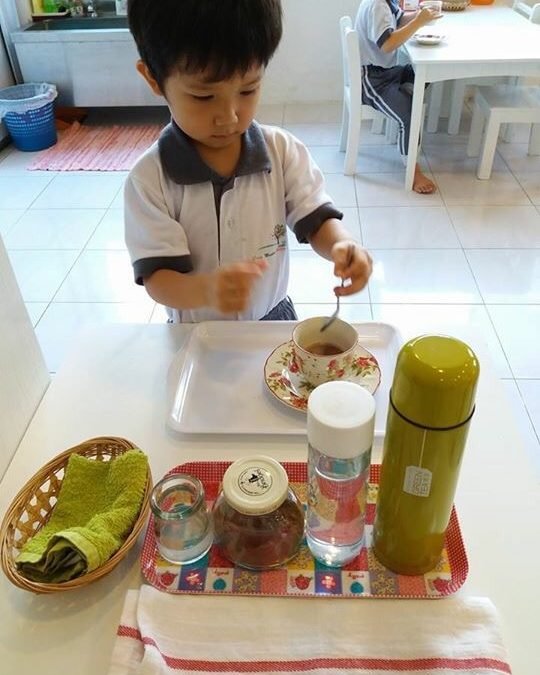这位小朋友在冲泡美禄,教具是: 热水壶、凉水杯、美禄、汤匙、当然还有高贵的英式下午茶杯。 孩子在操作教具时,老师们特意设计使用玻璃器皿,这是因为在示范教学时,孩子们会仔细地观察老师如何操作,再小心翼翼地使用教具,平和地把刚才老师示範的教具再展示一次。但是如果万一不小心把玻璃器皿打破时,老师的应对方式是让孩子站在一边,观察老师如何收拾危险玻璃碎片,这时,包括这位孩子及全班同学都会看在眼里,这当然也是一个黄金机会,让全班孩子同学都上了一堂课-如何不急不徐地解决问题。 经验告诉我,架子上玻璃器皿的教具,被打破的机率其实很低,这是因为孩子们知道这个教具的教育性,重复性使用让孩子更有信心掌握与使用玻璃器皿。 Why use glassware in Practical Life lessons? Hot water, Milo powder, measuring cup, teaspoon and an elegant set of saucer and cup. The setup of these items on the table excites children in the class, as they know they will get to make themselves a nice cup of Milo drink soon. “First, you put the cup on the saucer. Then, add two teaspoon of Milo……” Teacher carefully picks up each item and introduce the use and purpose, then patiently show and guide children the steps to make a cup of Milo drink. The classroom is filled with children’s laughter of joy as they celebrate the success of making themselves a drink. If a child accidentally breaks a glassware during the process, he will be asked to stand aside and observe how teacher calmly clean away the broken pieces. Although this would not be a desired outcome, but we would like the children to develop a sense on how to keep calm under pressure and solve problems. Speaking from my teaching experience, the risk of a child breaking glassware during classes is very low as long as they are educated, guided and given the platform to practise handling of fragile items. Visit GMM Blog to find out more

Recent Comments